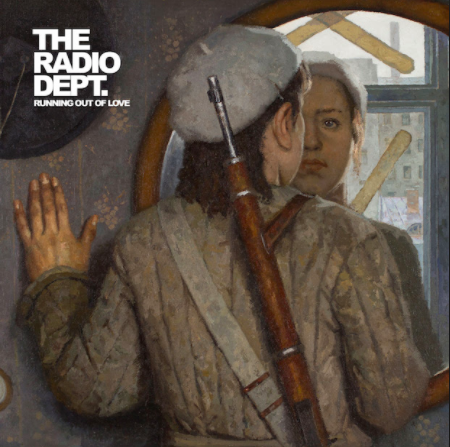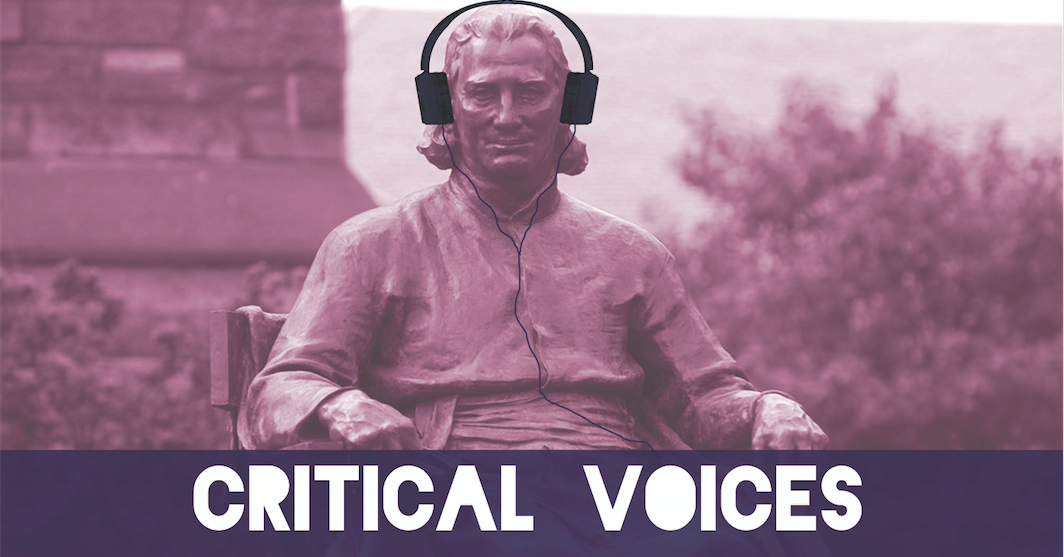Amid global political turmoil, relentless violence, and perpetual uncertainty, it’s tempting to avert one’s gaze, but The Radio Dept. has taken a courageous step to face these challenges head-on with their latest album, Running Out of Love (2016). In an interview with the Voice, the Radio Dept. described their inspirations, motivations, and challenges in constructing their highly anticipated new LP: a transformative, progressive work of art in both sound and content. Their unique sound is rooted in soft indie-rock and blanketed with elements of electronic dream-pop, and is layered over an echoing delivery of thoughtful lyrics, reflecting a sober recognition of the problems in the world today, the sincere fear that follows, and the commitment to be positive changemakers.

Photo: Labrador Records
The Swedish band has been producing masterful indie music for nearly twenty years, but has avoided excessive popularity by making only sporadic forays into the public eye. Running Out of Love is only the band’s fourth LP, and their current North American tour to promote this album is the first since the 2011 promotion of Clinging to a Scheme (2010). The Radio Dept.’s only tour in between took place during the summer of 2016, appearing in remote areas of Asia, including Ulaanbaatar, Mongolia, as well as larger cities such as Seoul and Beijing. Now, between Feb. 14 and Mar. 9, Radio Dept. is scheduled to play in concert almost every night, giving fans the rare opportunity to see a live performance of a band that typically avoids extended time on the road. The band will be playing in D.C. at the Black Cat on Feb.15. Tickets can be found here.
Shifting attention away from amassing popularity has allowed the Radio Dept. the space to focus on the artistry of their work, and it has paid off: Running Out of Love is well worth the six-year wait. The album maintains the heart of the Radio Dept.’s established style, but is full of risks and unexpected turns in all facets of composition, incorporating more defined synth, elements of dance, and a strikingly political message. The decisive shift involved a natural risk of losing some of their established fan base, but avoiding such risk would, as lead vocalist Johan Duncanson sometimes says, mean “meet[ing] everyone else’s expectations and ignor[ing] our own.” In an interview with the Voice this week, The Radio Dept. admitted that they have “no idea” what the current fan base will think of the new album, but said “We think we would quit the band if the goal was to please people.”
“Sloboda Narodu” opens Running Out of Love with soft guitar and steady hand drums, like a hopeful awakening that concludes with a call to action: “But don’t ask for patience / ‘Cause we just don’t have the time / Freedom now.” Suddenly, the gentle tones cut to the sharp keyboard that begins “Swedish Guns,” a dark track that sheds light on the underground weapon industry in Sweden. It’s an unapologetic eye-opener, rejecting the dreamy romanticism that dominates today’s indie pop music. “Lyrically, it was just the time we live in,” The Radio Dept. explained to the Voice. “It was impossible to avoid the tension in our country [and] world. We simply couldn’t write about anything else.”
Inspiration drawn from 90s-techno music permeates the album, elevating the energy of their previous work, effectively refreshing their style. “We think it started as a counterweight to clinging and we wanted to do something new. Musically, we were into early 90s techno and house and found that it was time for us to try to do an album in that spirit,” said The Radio Dept.
In effect, the bubbling synth rhythms and pulses introduce a determined energy. The varied, fast-paced synthesizer draws out the subtle nuances of Duncanson’s short-range vocals, building diversity in the dreamlike indie-electronic sound. In The Radio Dept.’s personal favorite song, “We Got Game,” this energy reflects the urgent, fearful response to today’s global chaos and uncertainty. “It’s about being genuinely scared of the times we live in and what we might have to do to change it,” they explained.
Other tracks leave room for listeners to ponder independently. Often in these tracks, the vocals sink beneath the synthesizer, relying on soft instrumentals to create the mood and making the most of minimal changes in tone. The strength of “Can’t Be Guilty” lies in this intricate layering: the song is built upon a gentle, heartbeat-like bass; the guitar chords ring at points of prominence; keyboard twinkles over the whispering verse; and the lyrics are contemplative and thought-provoking: “Not even death could lay his hands on me / I’m fast asleep and can’t be guilty.” The Radio Dept. beautifully portrays the internal conflict of wanting to distance oneself from inescapable issues and conflicts.
Running Out of Love may focus on global struggles in content, but The Radio Dept. faced more personal challenges during the album’s construction. “We live in different cities and we have to travel a lot so time is always an issue,” confided the band. “It didn’t help being on trial with our publisher,” referring to The Radio Dept.’s struggle to break the contract that the group has held with Labrador Records for almost 20 years, which concludes with the release of Running Out of Love. “We have settled our differences and we are no longer enemies, and that’s a relief for both parties, I think, but it was horrible there for a while.”
The Radio Dept.’s perseverance through such a trying time reveals the intersection of their personal experience, the message of Running Out of Love, and the last bit of advice that the band had to offer to their audience and the Voice: “don’t give up.” As much as The Radio Dept.’s work reflects uncertainty and fear, it is an embodiment of the strength to carry on and the resolve to make a difference.
Voice’s Choices: “Swedish Guns,” “We Got Game,” “This Thing Was Bound To Happen”





